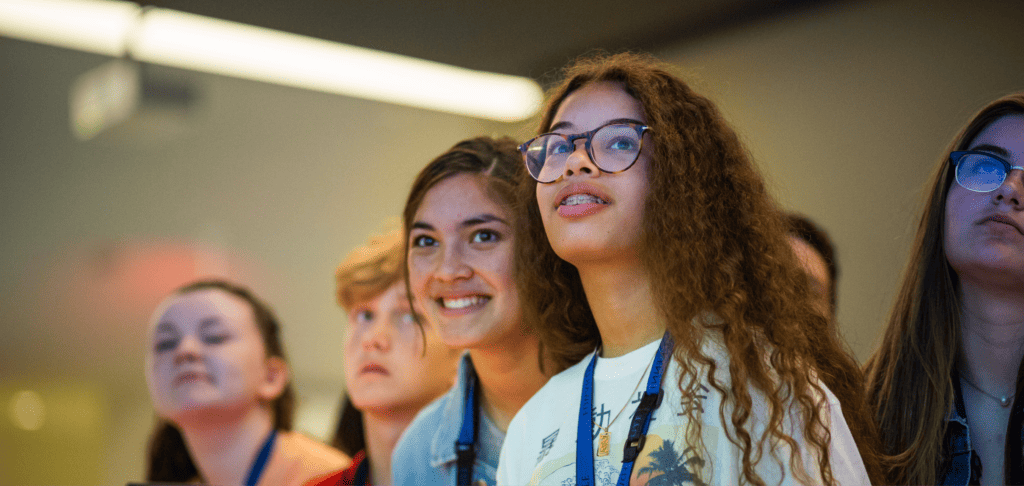SIM (Senate Immersion Module)
Grades 8-12
In-person visit (2.5 hours)
Number of participants: 32-100 students
The Kennedy Institute’s SIM is a 2.5-hour in-person program for students in grades 8-12 that employs role-play and a simulated Senate session to immerse students in learning about the legislative process, key legislatives issues, and the skills necessary for effective law making and sustainable civics life — civic dialogue and negotiating differences by identifying common interests.
Guided by education staff and individual tablets, students take on the roles of senators, engaged in building a bill to address a major policy issue facing the nation. After students are sworn in as senators, they review their state and party interests, interview expert witnesses, discuss and select provisions and amendments to add to the bill and vote in the Senate chamber. The SIM provides structured opportunities for students to learn about and discuss real legislative proposals from the perspectives of their senator roles. They are encouraged to reach across the aisle and work with other senators to identify mutual interests that will benefit their constituents.
Choose from these SIM topics:
Climate and Energy Policy: In this SIM students work together as senators to build a piece of legislation that focuses on how the United States should adjust its energy policy to meet the demands imposed by climate change, and what role the federal government should have in that process.
Election Reform: This SIM asks students to weigh several possible federal standards for how and when we register and vote, and how we ensure election integrity. Working together as senators, students consider how each provision of the bill they build might affect voter confidence, racial equity, and states’ discretion to determine election processes.
Technology Reform: Artificial Intelligence, Data Privacy, and Social Media: This SIM program gives students the opportunity to grapple with the most important technological matters of the 21st century. Students will work together as United States senators and craft legislation to regulate artificial intelligence, data privacy, and social media.
Criminal Justice Reform: In this SIM, students adopt the role of United States senators engaged in reforming America’s criminal justice system. Students will consider the future of mandatory minimum sentencing guidelines, training and treatment programs for federal prisoners, voting rights for federal prisoners, and more.
Today’s Vote
Grades 6-12
In-person visit (2 hours) or virtual program (1 hour)
Number of participants: 10-60 students (virtual) or 10-100 students (in-person)
Students participate in a simulated U.S. Senate session and a live floor debate on an actual piece of legislation pending before the Senate. Students will consider the issue from multiple perspectives, share their own ideas, and then cast their votes.
Groups can choose from the following topics:
- The Electoral College Learn more about the history, function, and significance of the Electoral College and why there’s a movement to end and replace it.
- The Green New Deal Unpack a plan to reshape the national economy in order to better protect our planet from climate change.
- Voting Rights Consider national legislative solutions to issues around voter access and election integrity.
Conference Committee
Grades 11-12
In-person (2 hours)
Number of participants: 24-32
In this 2-hour simulation students take on the role of a member of the House or Senate and engage in a Conference Committee, the process of reconciling bills from the two chambers of Congress. As students consider issues of policy, they also learn fundamental concepts of successful negotiation aimed at identifying areas of common interest and expanding beneficial outcomes. The session focuses on the Agriculture Act of 2014 (the “Farm Bill”) and the issues of farm subsidies and food assistance programs.
Real Life Civics: Traditions and Norms
Grades 8-12
Virtual program (1 hour)
Number of participants: 10-60 students
Real Life Civics: Traditions and Norms takes an accessible look at how the United States government operates within a framework of norms, traditions, customs, expectations, laws, constitutional language, and constitutional principles. When are norms and customs treated as if they are laws? When are laws treated more like norms? When is it necessary for a norm to be formalized into a law? Bring your questions for this interactive session.
Senate Chamber Virtual Tour
Grades 9-12
30 minutes
Number of participants: 10-60 students
Join a Kennedy Institute educator to learn about the Senate Chamber, and about the role of the Senate in shaping federal policy.




